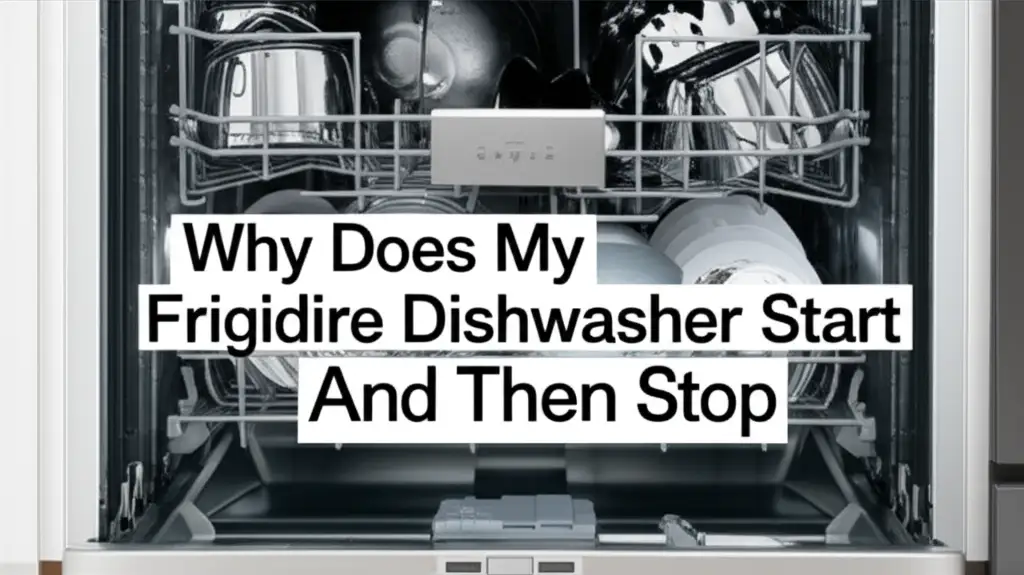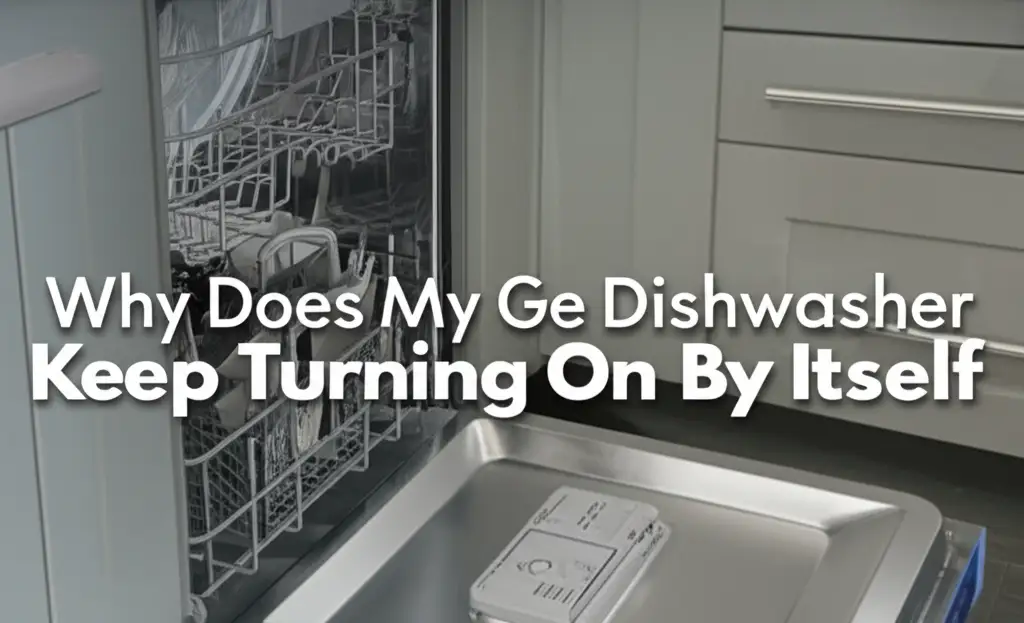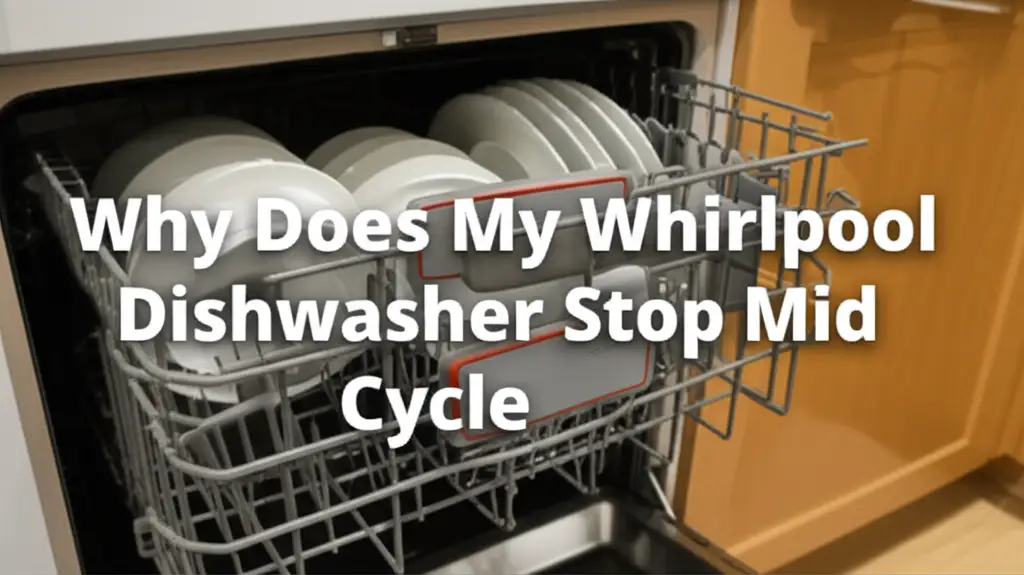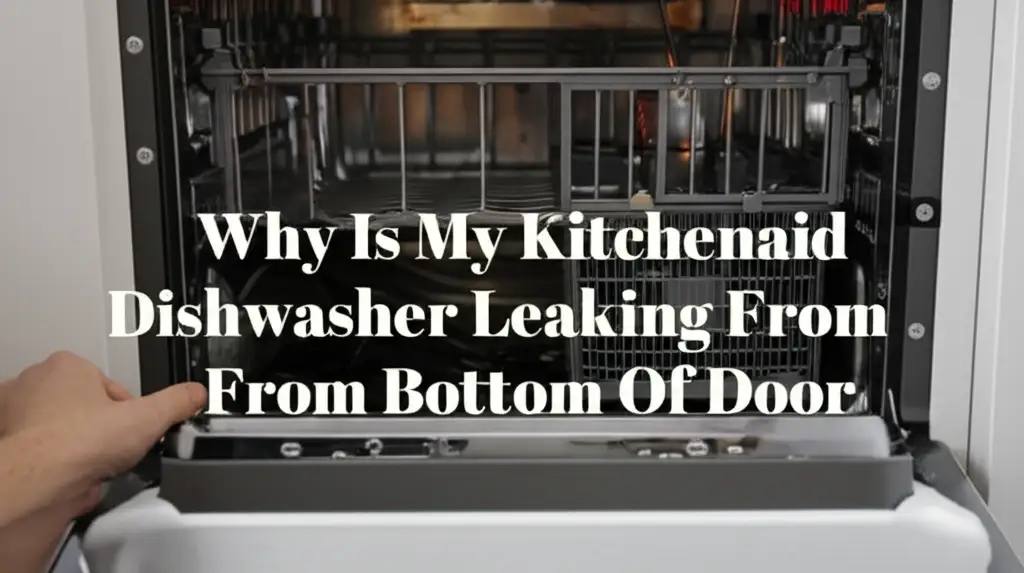· Katria Melrose · Appliance Repair · 24 min read
Why Does My Frigidaire Dishwasher Start And Then Stop

Frigidaire Dishwasher Starts, Then Stops: Troubleshooting Guide
Imagine loading your dishes, adding detergent, and pressing “Start” on your Frigidaire dishwasher. It hums to life for a few moments, maybe even fills with a bit of water, and then unexpectedly goes silent. You wonder, “Why does my Frigidaire dishwasher start and then stop?” This can be a frustrating experience, disrupting your kitchen routine and leaving you with dirty dishes.
I know how annoying it feels when an appliance acts up. This article will explore the most common reasons your Frigidaire dishwasher starts a cycle only to stop prematurely. We will cover everything from simple user errors to more complex component failures. By understanding these issues, you can diagnose the problem. You might even fix it yourself, saving time and money on service calls. Let’s get your dishwasher back to reliably cleaning dishes.
Takeaway
If your Frigidaire dishwasher starts and then stops, consider these key areas for troubleshooting:
- Check Power: Ensure stable electrical supply and proper breaker function.
- Inspect Door Latch: Verify the door is fully closed and latched.
- Assess Water Supply: Confirm adequate water pressure and inlet valve operation.
- Examine Drain System: Look for clogs in the filter or drain hose.
- Listen for Motor Sounds: Identify unusual noises that suggest pump or motor issues.
- Review Error Codes: Look for specific codes on the display.
- Reset the Dishwasher: A simple power cycle can sometimes resolve minor glitches.
When your Frigidaire dishwasher starts and then stops, it usually signals an interruption in power, an incomplete door closure, a water supply issue, or a malfunction in a critical component like the pump or control board. Addressing these common problems can help restore normal operation.
Understanding Interrupted Cycles in Your Frigidaire Dishwasher
Your Frigidaire dishwasher begins a cycle, then suddenly stops. This behavior indicates an interruption to its normal operation. Many factors can cause this, from simple user errors to more complex internal part failures. The dishwasher’s control system monitors various conditions, and it will pause or stop if any crucial condition is not met. Understanding these potential causes is the first step toward a solution.
This interruption often serves as a safety mechanism. The dishwasher prevents damage to itself or your home. For example, if it detects a leak or an overheating condition, it will shut down. This protective action is important, but it still means your dishes remain dirty. I find that knowing the “why” helps a lot in finding the “how to fix.” Pinpointing the exact moment it stops can offer valuable clues. Does it stop before filling with water, during the wash, or before draining? Each stage points to different potential problems.
Identifying the exact point of the stoppage is crucial for effective troubleshooting. If it stops immediately after you press start, the issue might be with the door latch or initial power delivery. If it fills with water but stops during the wash, it could indicate a pump or motor problem. Should it stop near the end, drainage or heating element issues might be at play. We will explore these possibilities in detail. Your Frigidaire dishwasher is designed with specific stages, and a stop at any stage indicates a problem within that phase.
Power Supply and Electrical Interruptions
A common reason why your Frigidaire dishwasher starts and then stops relates to its power supply. Dishwashers need a consistent and stable electrical connection to complete a cycle. Any interruption, even a brief one, can cause the machine to pause or shut down entirely. This can be as simple as a tripped circuit breaker or a loose power cord connection.
I always recommend checking the most obvious things first. Start by looking at your home’s electrical panel. Locate the circuit breaker for the dishwasher. If it is tripped (usually in an “off” or middle position), switch it completely off and then back on again. Sometimes, an overloaded circuit or a brief power surge can cause a breaker to trip. This protects your appliance from electrical damage. Ensure the dishwasher’s power cord is securely plugged into the wall outlet. A loose plug can lead to intermittent power.
Beyond the breaker and cord, internal electrical components can fail. A faulty outlet or a problem within the home’s wiring can also cause intermittent power. If the outlet feels loose or shows signs of burning, do not use it. Call a qualified electrician to inspect and repair the issue. Less common but possible are issues with the dishwasher’s internal wiring harness. Rodents might chew wires, or connections could come loose over time due to vibrations. These internal wiring issues are harder to diagnose without opening the appliance. For safety, always disconnect power before checking internal components.
- Tripped Circuit Breaker:
- Locate your home’s electrical panel.
- Find the breaker labeled for the dishwasher (or kitchen appliances).
- If it’s tripped, flip it completely off, then firmly back to the ‘on’ position.
- If it trips immediately again, a more serious electrical issue exists.
- Loose Power Cord:
- Ensure the power cord is fully inserted into the wall outlet.
- Check for any signs of damage on the cord itself.
- Faulty Wall Outlet:
- Test the outlet with another small appliance.
- If the outlet is dead, it needs professional repair.
Remember, issues like “power but won’t start” are related but distinct. If your Frigidaire dishwasher has power but won’t start, the problem might be more complex than a simple power interruption during a cycle. You can learn more about general starting issues here: Why Won’t My Frigidaire Dishwasher Start But Has Power.
Addressing Water Supply and Drainage Issues
Your Frigidaire dishwasher needs a continuous and adequate supply of water to complete its wash cycles. It also requires proper drainage to remove dirty water. If either of these systems fails or is interrupted, the dishwasher will likely start and then stop. This is a common protective measure; without water to wash or a clear path to drain, the cycle cannot continue safely or effectively.
First, let’s look at the water supply. The dishwasher needs enough water pressure and volume to fill properly. I always check the water inlet valve. This valve controls the flow of water into the dishwasher. If it’s faulty, clogged, or not fully opening, the dishwasher might start, try to fill, sense insufficient water, and then stop. Also, ensure the water supply shut-off valve (usually under the sink or behind the dishwasher) is fully open. Sometimes, it might have been accidentally bumped or turned off. A kinked or obstructed water inlet hose can also restrict water flow, leading to the same problem. If your Frigidaire dishwasher is not filling with water, it will quickly stop its cycle. You can find more specific troubleshooting for this issue here: Why Is My Frigidaire Dishwasher Not Filling With Water.
Next, consider drainage. Even if the dishwasher fills with water, it must drain that water before moving to the next stage of the cycle or at the end. A clogged drain filter, a kinked drain hose, or a malfunctioning drain pump can prevent proper drainage. The dishwasher might start the wash cycle, but if it cannot drain the initial fill or rinse water, it will eventually stop. Many dishwashers have sensors that detect standing water, triggering a shutdown. I’ve seen instances where food debris accumulates in the filter, causing blockages. Regularly cleaning the dishwasher filter is a good preventative measure. You can usually find the filter at the bottom of the wash tub. If your Frigidaire dishwasher is holding water in the bottom, this indicates a drainage problem. Find out more here: Why Is My Frigidaire Dishwasher Holding Water in Bottom.
- Water Inlet Valve:
- Ensure the water supply valve to the dishwasher is fully open.
- Check the water inlet hose for kinks or blockages.
- A faulty inlet valve might click but not allow water to pass or open intermittently.
- Drain Filter:
- Locate and remove the dishwasher’s filter assembly (usually at the bottom inside).
- Clean any food particles or debris thoroughly under running water.
- Drain Hose:
- Inspect the drain hose for kinks or crushes, especially behind the dishwasher or under the sink.
- Ensure the air gap (if installed) is not clogged.
- Drain Pump:
- Listen for the drain pump attempting to work. If it hums but doesn’t drain, it might be jammed.
- Accessing the drain pump usually requires disassembling parts of the dishwasher.
These water-related issues are very common causes for a Frigidaire dishwasher to start and then stop. Addressing them can often restore normal function.
Door Latch and Switch Malfunctions
One of the most frequent reasons your Frigidaire dishwasher starts and then stops is an issue with its door latch or door switch. For safety and proper operation, dishwashers are designed to run only when the door is securely closed and latched. If the door latch isn’t fully engaged, or if the door switch is faulty, the dishwasher’s control system will believe the door is open. It will then stop the cycle, often just moments after starting.
I’ve found that this is often the first thing to check, as it’s a simple fix if that’s the cause. First, ensure the dishwasher door is completely closed and latched. Sometimes, dishes or racks can prevent the door from closing properly. Push firmly on the door to ensure it clicks into place. Visually inspect the latch mechanism on the door and the strike plate on the dishwasher frame. Look for any visible damage, wear, or misalignment. A bent latch or a chipped strike plate can prevent a secure connection. If the latch doesn’t feel firm when you close it, it might be worn out.
If the latch mechanism appears fine, the problem likely lies with the door switch. The door switch is an electrical component located near the latch assembly. It sends a signal to the control board, indicating whether the door is open or closed. If this switch becomes defective, it might intermittently send an “open” signal even when the door is closed. This causes the dishwasher to stop. Over time, these switches can wear out or become coated with grime, leading to unreliable operation. Replacing a faulty door latch or switch usually resolves this issue. Remember, before working on any internal components, always unplug the dishwasher from its power source.
- Check Door Closure:
- Push the dishwasher door firmly until you hear or feel it click shut.
- Ensure no dishes or racks are blocking the door from fully closing.
- Inspect Latch Mechanism:
- Examine the physical latch on the door and the strike on the dishwasher tub.
- Look for cracks, bends, or excessive wear.
- A misaligned door can prevent the latch from engaging correctly.
- Test Door Switch:
- While more complex, a faulty door switch will fail to send the correct signal.
- Some Frigidaire models might display an error code related to the door if the switch is problematic.
- If the switch is suspected, a multimeter can confirm continuity, but this often requires professional help.
Resolving door latch or switch issues is often straightforward and can quickly get your Frigidaire dishwasher running through its full cycle again.
Overheating and Thermal Protection Activation
Your Frigidaire dishwasher might start a cycle and then stop due to an overheating condition. Dishwashers are equipped with safety mechanisms, primarily thermal fuses or thermostats, designed to prevent damage from excessive heat. If the internal temperature rises beyond a safe limit, these components will cut power to the heating element or the entire unit, causing the dishwasher to stop prematurely.
Overheating can stem from several sources. One common culprit is a faulty heating element that stays on too long or heats too aggressively. The heating element is responsible for heating the water during the wash cycle and aiding in drying. If it malfunctions, it can cause the water or the internal components to get too hot. This triggers the thermal cutoff. Another cause can be a restricted water flow. If the dishwasher does not fill with enough water, the heating element might try to heat a very small amount of water or even operate in dry conditions, leading to rapid temperature increases. I once dealt with a similar situation where insufficient water was the core problem.
Poor circulation can also contribute to overheating. If the spray arms are clogged or the circulation pump is weak, water might not be adequately distributed. This can create hot spots within the tub. The thermal fuse, a one-time safety device, will blow if temperatures exceed a critical threshold. Once it blows, it needs to be replaced. A thermostat, on the other hand, can reset once the temperature drops, but if it keeps tripping, it indicates an underlying issue. Always allow the dishwasher to cool down completely before attempting to restart it after an overheating shutdown. If the problem persists, professional diagnosis of the heating element, thermostat, or circulation system is recommended.
- Thermal Fuse:
- Acts as a safety cut-off if temperatures become too high.
- If it blows, it must be replaced. This usually points to an underlying issue.
- Thermostat:
- Monitors water temperature. If faulty, it might inaccurately read temperatures or fail to regulate them.
- A tripping thermostat indicates the system is getting too hot.
- Heating Element:
- A defective heating element can cause excessive heat.
- It might remain “on” constantly or short-circuit, leading to overheating.
- Insufficient Water Fill:
- If the dishwasher doesn’t fill with enough water, the heating element can quickly overheat the small amount of water or the air inside. This ties back to issues discussed in the water supply section.
When your Frigidaire dishwasher stops due to overheating, it is a critical warning. Addressing the root cause is essential to prevent further damage.
Diagnosing Motor and Pump Issues
When your Frigidaire dishwasher starts and then stops, especially if it makes unusual noises or no noise at all after starting, the motor or pump could be at fault. The dishwasher relies on several pumps to function: a wash pump (also known as the circulation motor) to spray water, and a drain pump to remove water. If either of these components fails or encounters an obstruction, the cycle will be interrupted.
I’ve learned that listening closely to the sounds your dishwasher makes can offer significant clues. If the dishwasher fills with water but then stops, and you hear a humming or buzzing sound but no water spraying, it points to the wash pump. This pump circulates water through the spray arms. It might be seized, have a clogged impeller, or its motor could be failing. A common issue is debris, like broken glass or food particles, getting stuck in the impeller, preventing it from spinning freely. This causes the motor to hum, draw too much current, and eventually trigger a shutdown. If the dishwasher attempts to drain but stops, and you hear a similar humming from the drain area, the drain pump might be obstructed or faulty.
Replacing a motor or pump is a more involved repair, often requiring tools and a good understanding of appliance disassembly. Before assuming a complete component failure, always check for obstructions. Sometimes, a foreign object is simply jamming the impeller. However, if the motor or pump is truly burned out, you might notice a distinct electrical smell or complete silence from that component. If your Frigidaire dishwasher has power but won’t start any action, a major motor or pump failure might be the underlying cause. While this article focuses on stopping mid-cycle, general “not starting” issues often share root causes with motor problems. You can review common starting issues here: Why Does My Frigidaire Dishwasher Have Power But Won’t Start.
- Wash Pump (Circulation Motor):
- Symptoms: Fills with water, but no spray, hums, then stops.
- Causes: Clogged impeller (food debris, broken glass), worn bearings, motor winding failure.
- Action: Inspect impeller for obstructions, test motor for continuity if comfortable.
- Drain Pump:
- Symptoms: Dishwasher completes wash but stops before or during drain cycle, water left at bottom, hums, then stops.
- Causes: Jammed impeller, faulty motor, electrical short.
- Action: Check for debris in the pump, test electrical connections.
These internal mechanical issues are complex. They often require the assistance of a qualified technician.
Control Board and Software Glitches
When your Frigidaire dishwasher starts and then stops without an apparent mechanical issue, the problem could lie with the control board. The control board is the “brain” of your dishwasher. It manages all functions, from water intake and heating to pump operation and cycle timing. If this board malfunctions or experiences a software glitch, it can send incorrect signals or fail to send any signals, causing the dishwasher to stop unexpectedly.
I’ve seen many instances where electronic components cause erratic behavior. A power surge, a manufacturing defect, or simply old age can damage the control board. Symptoms of a faulty control board are often intermittent and unpredictable. The dishwasher might stop at different points in the cycle each time. It might display strange error codes or no codes at all. Sometimes, the buttons on the control panel might become unresponsive or stick. If you’ve checked all other common issues like power, water, and door latch, the control board becomes a strong suspect. Unfortunately, control board repair is rarely an option; replacement is almost always necessary.
Before assuming the control board is completely failed, try a simple reset. Disconnect power to the dishwasher for 5-10 minutes by unplugging it or flipping the circuit breaker. This is similar to restarting a computer. It can sometimes clear minor software glitches or temporary errors that are causing the machine to stop. After the waiting period, restore power and try to start a new cycle. If the issue persists after a reset, and no other mechanical problems are evident, a professional diagnosis of the control board is advisable. These components are expensive, so proper diagnosis is key.
- Intermittent Stops:
- The dishwasher stops at random points in the cycle.
- It might work fine sometimes, then fail other times.
- Error Codes:
- The display shows an error code that doesn’t correspond to a clear mechanical issue.
- Consult your Frigidaire manual for specific error code meanings.
- Unresponsive Buttons:
- Control panel buttons might not respond correctly or seem “stuck.”
- Power Cycling (Reset):
- Turn off the circuit breaker for 5-10 minutes.
- Restore power and attempt to run a cycle. This often clears minor electronic errors.
- Professional Diagnosis:
- If a reset fails and other checks yield no results, a technician can test the control board’s functionality.
A malfunctioning control board is a complex issue. It often requires professional expertise for accurate diagnosis and repair.
Common User Errors and Simple Fixes
Sometimes, your Frigidaire dishwasher starts and then stops for reasons simpler than component failure. User errors or overlooked basic checks can often be the culprit. I always start with these quick checks before diving into more complex troubleshooting. It saves a lot of time and potential repair costs.
One of the most common user errors involves how the dishwasher is loaded. Overloading the dishwasher can prevent proper water circulation, leading to uneven washing and potential stopping. Large items can block spray arms or interfere with the door seal. Ensure dishes are arranged to allow water to reach all surfaces and that nothing obstructs the spray arms from rotating freely. Similarly, using too much or the wrong type of detergent can create excessive suds. This foam can confuse the dishwasher’s sensors, making it think there’s a leak or a problem with water levels, causing it to stop the cycle. Always use detergent specifically designed for dishwashers and follow the recommended amounts.
Another common oversight is the “Cancel” or “Reset” function. Accidentally pressing the cancel button or selecting a program incorrectly can lead to an unexpected stop. Many Frigidaire dishwashers have specific ways to start a cycle and to cancel one. If your dishwasher stops, first check if any lights indicate a “cancel” mode or if you inadvertently pressed a wrong button. Sometimes, simply knowing how to properly start or cancel a Frigidaire dishwasher cycle can resolve an issue. For instance, if you pressed the wrong button, you might need to know How to Cancel Frigidaire Dishwasher before restarting. Understanding how to interact with your specific model’s controls is important. Also, ensure the chosen cycle is appropriate for the load. Some specialized cycles have specific requirements.
- Overloading:
- Do not cram too many dishes into the dishwasher.
- Ensure proper spacing for water and detergent access.
- Improper Dish Placement:
- Avoid blocking spray arms or detergent dispenser.
- Large items can sometimes interfere with the door latch sensor.
- Detergent Issues:
- Use only automatic dishwasher detergent.
- Follow dosage recommendations to avoid oversudsing.
- Accidental Button Press:
- Check if you or someone else accidentally pressed “Cancel” or “Pause.”
- Review your dishwasher’s control panel for any illuminated indicators.
- Cycle Selection:
- Ensure the selected wash cycle is suitable and that all required options (e.g., heated dry, sanitize) are correctly chosen.
- Some cycles have specific temperature or water level requirements that might trigger a stop if not met.
By addressing these simple user-related issues, you might quickly get your Frigidaire dishwasher back to its regular cleaning routine without needing professional help.
Troubleshooting Error Codes and Display Messages
Modern Frigidaire dishwashers often provide valuable clues when they encounter a problem. They do this through error codes or flashing lights on the control panel display. When your Frigidaire dishwasher starts and then stops, checking for these messages is a critical troubleshooting step. These codes are designed to tell you exactly what issue the dishwasher’s internal diagnostics system has detected.
I always recommend consulting your dishwasher’s user manual as soon as an error code appears. The manual contains a complete list of error codes specific to your model and what each one signifies. For example, a code like “E1” or “F2” might indicate a water fill issue, while “E3” could point to a heating problem. If no explicit code appears, pay attention to the pattern of flashing lights, as some models use these as an alternative to a digital display. Each pattern usually corresponds to a specific fault. Understanding these codes empowers you to diagnose the problem more accurately.
Once you identify the error code, the manual will also provide basic troubleshooting steps for that specific issue. This might involve checking a specific component, resetting the dishwasher, or confirming a physical connection. Sometimes, an error code is temporary and can be cleared with a simple power cycle or by pressing the “Cancel” button. However, if the same error code reappears consistently after a reset, it points to a persistent underlying problem that requires further investigation. While I don’t list specific Frigidaire codes here (as they vary by model), the principle remains the same: the code is your roadmap to the problem.
- Locate the Error Code:
- Look at the digital display on your control panel.
- Note any numbers or letters that appear.
- If no digital display, observe the pattern of flashing lights (e.g., Start/Pause light flashing multiple times).
- Consult Your Manual:
- Find the “Troubleshooting” or “Error Codes” section in your Frigidaire dishwasher’s user manual.
- Match the code or light pattern to its meaning.
- Follow Manual’s Advice:
- The manual will suggest specific actions for each code, such as checking water supply, door latch, or filters.
- Clear the Code:
- Often, you can clear an error code by pressing “Cancel/Drain” or by performing a hard reset (turning off power at the breaker for a few minutes).
- If the code returns immediately, the underlying issue persists.
Error codes streamline the diagnostic process, guiding you toward the likely cause when your Frigidaire dishwasher starts and then stops.
When to Call a Professional Appliance Technician
While many Frigidaire dishwasher issues can be diagnosed and even resolved with basic troubleshooting, there comes a point where calling a professional appliance technician is the safest and most practical option. I’ve learned that knowing when to seek expert help can save you from further damage, potential injury, and ultimately, more expensive repairs down the line.
You should consider professional help if you’ve tried all the common troubleshooting steps—checking power, water supply, door latch, and filters—and your Frigidaire dishwasher still starts and then stops. If you encounter error codes that don’t make sense or persist after a reset, it’s a good sign that a deeper issue is at play. Similarly, if you suspect a problem with major components like the wash pump, drain pump, heating element, or control board, these repairs often require specialized tools, diagnostic equipment, and technical knowledge that most homeowners do not possess. Attempting complex repairs without the proper expertise can worsen the problem or even create new safety hazards.
Safety is paramount when dealing with electrical appliances and water. If you notice any burning smells, smoke, sparks, or if the dishwasher is leaking significantly (and it’s not a simple drain hose issue), immediately disconnect power and call a professional. Similarly, if you are uncomfortable working with electricity or disassembling parts of your appliance, it’s always best to err on the side of caution. A qualified technician can quickly and accurately diagnose the problem, explain your options, and perform the repair safely and efficiently. Investing in professional service ensures the job is done right and your dishwasher operates reliably for years to come.
- Persistent Issues:
- You’ve tried all basic troubleshooting steps, but the dishwasher still stops.
- Error codes reappear immediately after a reset.
- Complex Component Failures:
- Suspected issues with the control board, wash pump, drain pump, or heating element.
- These parts are often difficult to access and expensive to replace.
- Safety Concerns:
- Foul odors (burning plastic/wire), smoke, sparks, or significant leaks.
- Any situation where you feel unsafe performing the repair yourself.
- Lack of Tools or Expertise:
- You don’t have the necessary tools (e.g., multimeter) or knowledge to safely disassemble and test components.
- Warranty:
- If your Frigidaire dishwasher is still under warranty, attempting DIY repairs might void it. Check your warranty terms before proceeding.
Remember, a professional technician can not only fix the immediate problem but also often identify underlying issues that could lead to future breakdowns.
FAQ Section
Q1: Why does my Frigidaire dishwasher just click and then stop? A1: If your Frigidaire dishwasher clicks and stops, it often indicates a problem with the door latch or the door switch. The control board hears the click of a relay trying to start, but the door sensor tells it the door is open. This safety mechanism prevents operation. Check if the door is fully closed and latched. If it is, the door switch itself may be faulty and needs replacement.
Q2: What does it mean if my Frigidaire dishwasher stops after a few minutes? A2: If your Frigidaire dishwasher stops after a few minutes, it often indicates a problem with water intake or sensing. It might try to fill but fail to detect enough water pressure or volume, triggering a stop. Check your water supply valve. Ensure the inlet hose is not kinked. A faulty water inlet valve or flow sensor could also be the cause.
Q3: Can an overloaded dishwasher cause it to stop mid-cycle? A3: Yes, an overloaded dishwasher can definitely cause it to stop mid-cycle. Too many dishes can block the spray arms, preventing proper water circulation. This can lead to inefficient washing or make the dishwasher work harder than intended, causing its motor or pumps to overheat and trigger a safety shutdown. Always load your dishwasher according to the manufacturer’s guidelines.
Q4: How do I reset my Frigidaire dishwasher when it stops? A4: To reset your Frigidaire dishwasher, first try pressing the “Cancel/Drain” button, which usually initiates a short drain cycle and clears the program. If that doesn’t work, turn off the circuit breaker for your dishwasher at your home’s electrical panel. Wait 5-10 minutes, then flip the breaker back on. This hard reset can often clear electronic glitches.
Q5: Why would my Frigidaire dishwasher stop with standing water inside? A5: If your Frigidaire dishwasher stops with standing water, it means it failed to drain properly. This points to a drainage issue. Common culprits include a clogged drain filter, a kinked or blocked drain hose, a malfunctioning drain pump, or an issue with the air gap (if installed). Clean the filter and inspect the drain hose for obstructions.
Q6: Is a flickering display related to my Frigidaire dishwasher stopping? A6: Yes, a flickering display can be related to your Frigidaire dishwasher stopping unexpectedly. A flickering display often indicates an unstable power supply to the control board or a failing control board itself. Intermittent power fluctuations can disrupt the board’s operation, causing the dishwasher to stop a cycle. Check power connections and consider a control board issue if it persists.
Conclusion
It can be incredibly frustrating when your Frigidaire dishwasher starts its cycle only to stop unexpectedly, leaving you with a sink full of dirty dishes. However, as we’ve explored, this common issue has a range of identifiable causes, from simple user errors to more complex component failures. I truly hope this comprehensive guide helps you pinpoint why your Frigidaire dishwasher starts and then stops.
Remember to begin your troubleshooting with the simplest solutions, such as checking the power supply, ensuring the door is fully latched, and inspecting for common obstructions in the water or drain lines. Many problems can be resolved with a quick check or a simple reset. For more intricate issues involving the motor, pumps, or control board, recognizing when to call a professional can save you time, effort, and prevent further damage. By systematically working through these steps, you can often diagnose and fix the problem yourself, restoring your Frigidaire dishwasher to its full, reliable cleaning power. Don’t let a stalled cycle dampen your day; empower yourself with knowledge and get your dishes sparkling clean again!
- Frigidaire dishwasher
- dishwasher troubleshooting
- appliance repair
- dishwasher not working
- dishwasher stops





